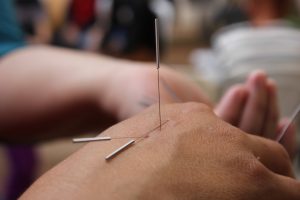
Acupuncture is a form of traditional Chinese medicine that dates back more than 2,000 years and is still used today as an alternative form of medicine. It is based on the belief that our bodies have an energy called “qi” (pronounced “chee”) that must be balanced for optimal health. The aim of acupuncture is to restore balance in the body’s energy by stimulating energy flow throughout the body.
How Does Acupuncture Work?
The basic principle behind acupuncture is that the body is composed of energy pathways that connect all parts of the body. When these pathways become blocked, energy is unable to flow freely, resulting in pain, illness, or other ailments. Acupuncture seeks to unblock these pathways and restore the body to a state of balance and health.
The practice of acupuncture involves the insertion of very thin needles into specific points on the body. This stimulates the body’s natural healing mechanisms and helps to restore balance. These points are connected to the body’s energy pathways, and by stimulating them, the body can be encouraged to heal itself.
Acupuncture is used to treat a wide range of conditions, such as headaches, digestive problems, and chronic pain. It can also be used to improve overall health and wellbeing, reduce stress levels, and enhance energy levels.
The theory behind acupuncture is complex and not fully understood by Western medicine. However, research has suggested that acupuncture may work by stimulating the release of endorphins, the body’s natural painkillers, and by affecting the nervous system.
Experiments have also suggested that acupuncture may affect the release of neurotransmitters, which are chemicals involved in the transmission of signals between nerve cells. It has been suggested that acupuncture may stimulate the release of hormones such as endorphin, serotonin and melatonin, which are known to affect mood.
Studies have also suggested that acupuncture may be able to influence the immune system, making it more effective at fighting off disease. It has been postulated that the insertion of needles into specific points on the body can stimulate and activate the body’s natural defense mechanisms, making it more effective at fighting off infection and disease.
In addition to its effects on the body, acupuncture has also been found to have psychological benefits. Research has suggested that acupuncture can reduce stress levels, help to combat depression and anxiety, and boost overall wellbeing.
The exact mechanism by which acupuncture works is still not fully understood. However, it is clear that this ancient practice has a range of potential benefits, both physical and psychological. For those looking for an alternative form of healing, acupuncture may be worth exploring.
What Are the Benefits of Acupuncture?
In recent years, acupuncture has become increasingly popular among those looking for a natural remedy to their ailments. Its therapeutic benefits are well-documented, and studies have shown that it can be beneficial in treating a variety of conditions.
One of the main benefits of acupuncture is its ability to reduce pain. Studies have shown that acupuncture can be an effective treatment for chronic pain, including neck pain, lower back pain, headaches, and arthritis pain. It can also be used to relieve muscle tension, improve circulation, and accelerate healing.
Another benefit of acupuncture is its ability to improve overall health. Research has shown that acupuncture can help reduce stress and anxiety, improve sleep, and boost the immune system. It can also help with digestive issues, such as nausea, constipation, and bloating.
Acupuncture is also a great way to improve overall wellbeing. It has been shown to increase endorphins, which are responsible for creating a sense of happiness and contentment. It can also help with depression, anxiety, and stress, as well as improve overall mental clarity.
Acupuncture can also be used as a preventive measure for certain health conditions. Research has shown that acupuncture can help reduce the risk of some types of cancers, including breast cancer and prostate cancer. It can also help reduce the severity of symptoms associated with menopause and help with fertility issues.

What Are the Risks of Acupuncture?
It’s natural to be curious about the potential benefits of this treatment, but it’s also important to be aware of the possible risks of acupuncture.
While acupuncture is generally considered safe, there are some risks that should be taken into consideration before undergoing the treatment.
The most common risk associated with acupuncture is infection. Whenever needles are used, there is a risk of infection, especially if the needles are not properly sterilized. The risk of infection can be minimized by ensuring that the needles are new and sterile, and by only using acupuncture needles from a certified practitioner.
In addition, the needles used in acupuncture can cause bruising, swelling and pain. The sensation may be more intense than you expect, so it is important to discuss any concerns with your practitioner before the treatment begins.
Acupuncture can also cause nerve damage if the needles are inserted too deeply. Nerve damage can be extremely painful and can cause numbness, tingling and discoloration. It’s important to discuss the depth of insertion with your practitioner before the treatment begins.
There is also a risk of allergic reaction to the needles used in acupuncture, particularly if the needles are made from metal. The reaction can occur immediately or several hours after the treatment is completed.
Also, there is a risk of internal organ damage if the needles are inserted too deeply into the body. This risk is rare and is more likely to occur with inexperienced practitioners. It is important to ensure that the practitioner is certified and experienced before undergoing acupuncture.
Overall, the risks associated with acupuncture are relatively minor and can be minimized with proper precaution. It’s important to discuss any concerns with your practitioner before the treatment begins, and to ensure that they are certified and experienced.
Acupuncture can be an effective way to treat pain and ailments, but it’s important to be aware of the potential risks before undergoing the treatment. By understanding the risks, you can take necessary precautions to ensure that the treatment is safe and effective.